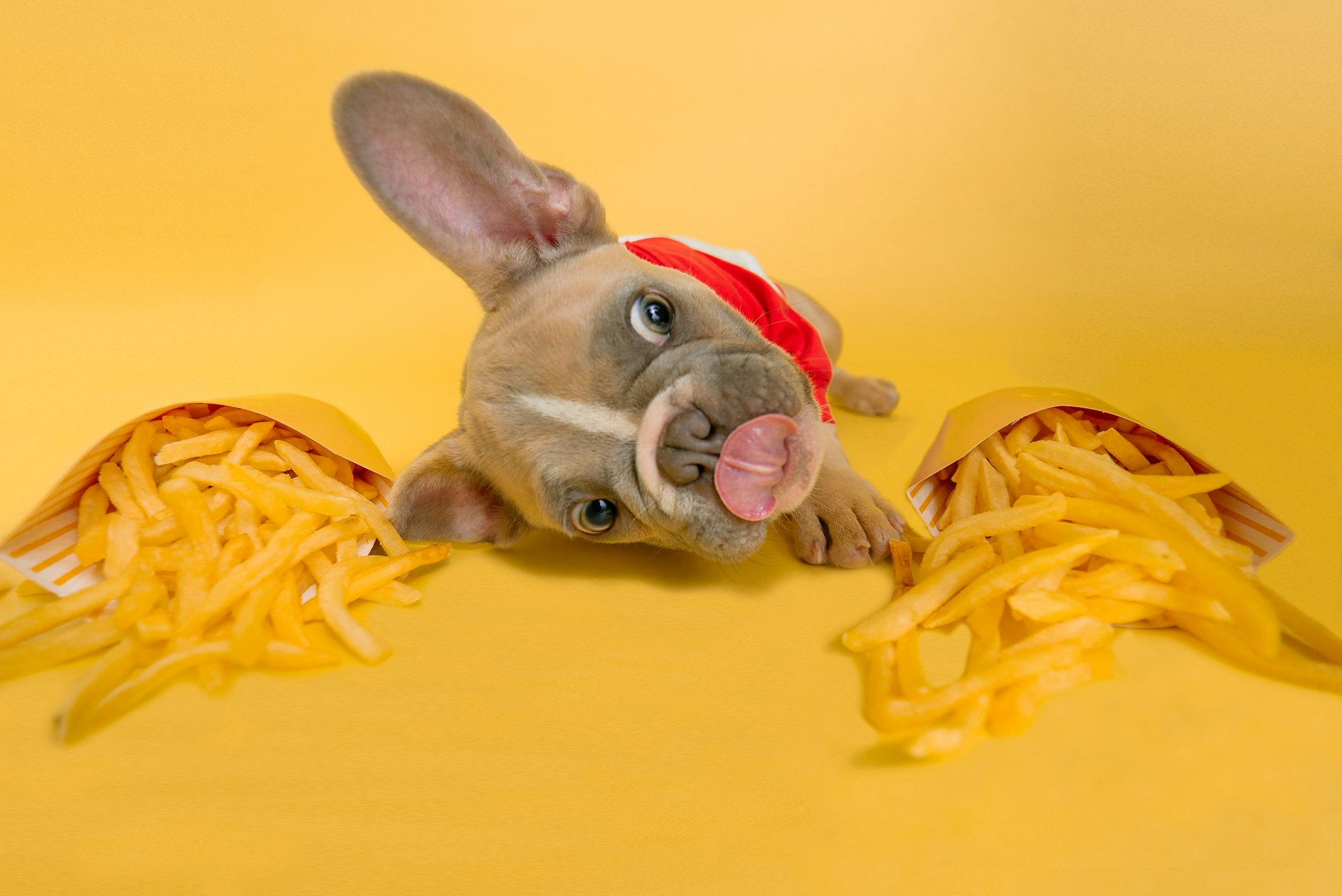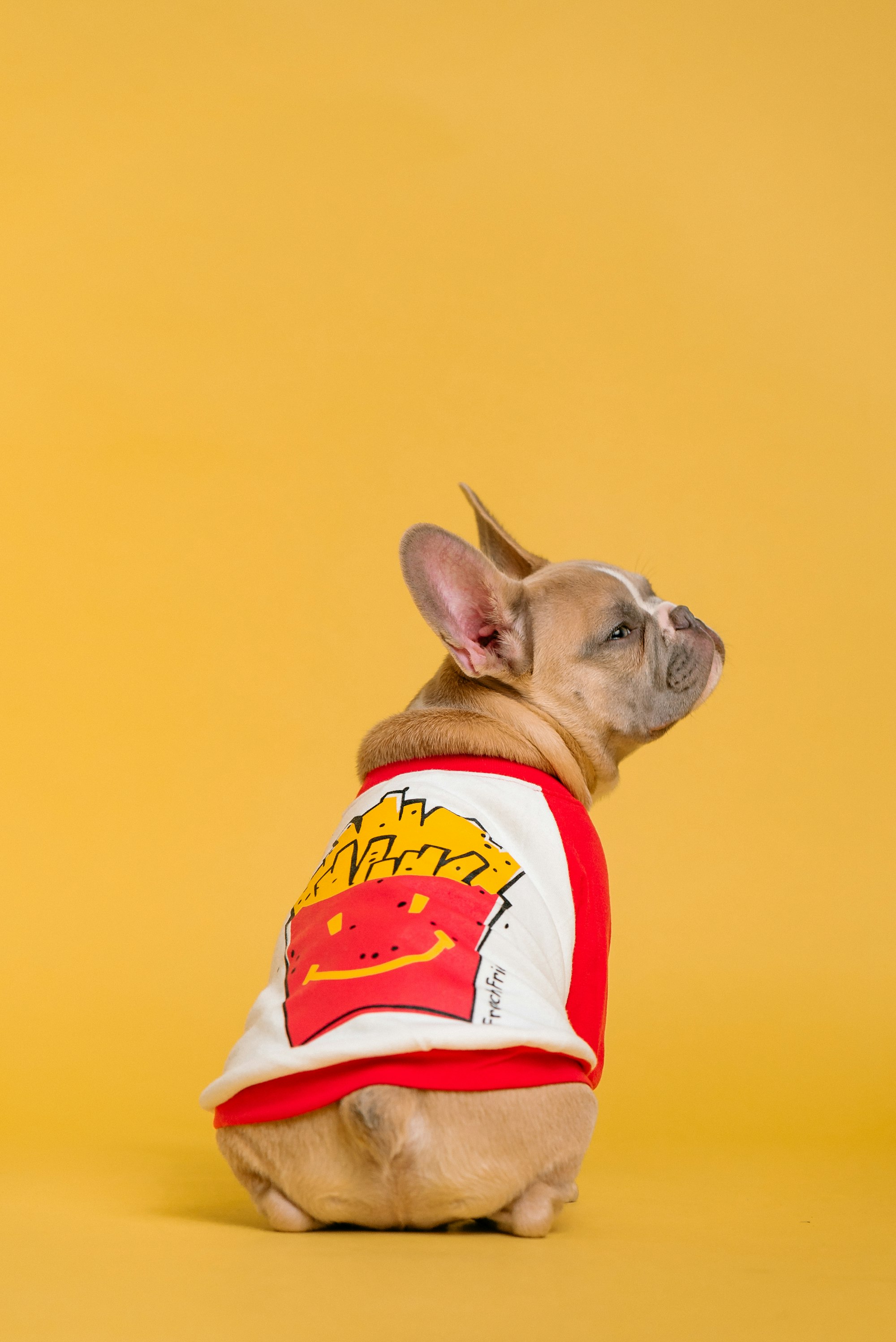Many dog owners may wonder, Can dogs eat French fries?. It's an important question. After all, who hasn't watched those puppy eyes beg as you indulge in a salty, crunchy snack at the local diner or even the comfort of your own home?
Imagine this scenario. You're relaxing on a sunny afternoon at your favorite café. You've got a plate of golden, crispy French fries in front of you. Your faithful furry companion, your dog, sits by your side, staring longingly at your food. You feel tempted to throw one his way. But should you?
The Risks of Dogs Eating French Fries
If you've ever considered sharing your fries with your four-legged friend, it's crucial to understand the risks involved. Sure, a single fry won't likely send your dog to the vet, but regular consumption of this fast food item could lead to health problems over time.

High Salt Content
Firstly, French fries contain high levels of salt. Dogs, just like humans, need some sodium in their diet for essential body functions. However, excessive amounts can be harmful, potentially leading to conditions like sodium ion poisoning. Symptoms include vomiting, diarrhea, seizures, and even death in extreme cases.
Oily, Fried Food is Bad for Dogs
Next, we can't forget that French fries are fried in oil. This results in a high fat content which is a recipe for disaster when it comes to dogs. Regular consumption of such oily foods can lead to pancreatitis, a painful condition that can cause appetite loss, vomiting, and fatigue in your pup.
Potato Toxicity
Even the primary ingredient, potatoes, can be problematic. Raw potatoes, particularly green ones, contain solanine, a compound that's toxic to dogs. Although cooking destroys most of this compound, some might remain.
Healthy Alternatives to French Fries
So, if French fries are out, what can you give your dog instead?
Fresh Vegetables
Healthy, dog-safe veggies are a fantastic alternative. Carrots, cucumbers, or even bell peppers are both nutritious and low in calories. Remember, though, to always wash and prepare these vegetables properly.
Homemade Dog Treats
Why not try your hand at making homemade dog treats? You can use safe, healthy ingredients like sweet potato or pumpkin. There are plenty of recipes online that are simple and fun to make.
Bully Stick
Consider also giving your dog a bully stick. They're a great source of protein, and dogs love them!
Store-bought Dog Treats
Of course, there are also plenty of store-bought treats you can offer your dog. Just make sure to look for those with natural ingredients and no added salt or artificial preservatives.
Essentials for a Healthy Dog Diet
When it comes to feeding your dog, balance is key.
Dog Food Container
Invest in a high-quality dog food container to keep your dog's food fresh and safe from contaminants.
Martingale Collar
A martingale collar can be helpful during feeding times, particularly if you have a stubborn eater. This type of collar provides gentle control without causing discomfort.
Healthy Treats
Always have healthy treats on hand.
Best Practices for Dog Owners
As a dog owner, you play a vital role in ensuring your furry friend's health and well-being.
Dog Life Jacket
When engaging in outdoor activities, don't forget safety measures. If you plan on being near water, a dog life jacket is a must.
Dog Backpack
If you're going on a hike, a dog backpack is a handy tool. You can store treats and other essentials without adding extra weight to your pack.
Dog Stroller
Finally, for older dogs or those with mobility issues, a dog stroller can be a godsend. It allows your dog to join you on outings without straining their joints.
So, while your dog may not be able to share your love of French fries, with these tips, you can ensure that they have plenty of tasty, healthier alternatives to enjoy. Remember, their health is in your hands!
The Importance of Portion Control
Just like humans, dogs need a balanced diet. Sure, carrots, cucumbers, and bell peppers are healthier alternatives to French fries, but serving size matters too. You don't want to replace one bad habit with another. It's essential to remember that treats (yes, even healthy ones!) should make up no more than 10% of your dog's daily caloric intake.
Regular Exercise is Crucial
While diet is a significant factor in your dog's health, it's only half the battle. Regular exercise is just as crucial. A sedentary lifestyle can lead to obesity and related health problems, just as a diet full of French fries can.
Regular Vet Check-ups
Regular vet check-ups are also vital to catch potential health problems early. They can provide valuable advice on your dog's diet and exercise routine. Always consult with your vet before making significant changes to your dog's diet.

Knowledge is Power
Knowing what foods are safe for your dog to eat is powerful. It allows you to make informed decisions about what treats you can share with your pup. Remember, while French fries might be a no-no, plenty of dog-friendly foods are just as tasty (if not more so!) and far healthier.
Understanding Dog Nutrition
Just as we need a balanced diet for optimal health, our dogs do too. The food your dog eats significantly impacts their overall health, energy levels, and quality of life. While you might think a small, crispy French fry won't do any harm, the long-term effects of poor nutrition can be detrimental.
One key factor is understanding the difference between human food and dog food. Foods like French fries, which humans can tolerate, aren't always safe for dogs. They have different nutritional needs, and what's tasty and harmless to us can be harmful to them.
Signs Your Dog Has Eaten Something Harmful
If your dog has eaten French fries or other harmful foods, it's important to watch out for signs of distress. These might include excessive thirst, diarrhea, vomiting, reduced appetite, or lethargy. If you observe any of these symptoms, seek veterinary help immediately.
Training Your Dog to Resist Human Food
To avoid the French fry dilemma, it's helpful to train your dog to resist human food. Reward good behavior and discourage begging. If your dog understands that they won't get a treat from the dinner table, they'll be less likely to beg or snatch food.
Use a martingale collar for effective and gentle control during training. These collars are designed to provide comfortable correction, making them perfect for training dogs to follow commands..
The Role of Exercise
Maintaining a healthy weight isn't just about diet, but also about exercise. Regular physical activity can help keep your dog's weight in check and their joints flexible. Consider using a dog backpack during walks or hikes to give your dog a job to do. This can provide mental stimulation as well as physical exercise.
Be Prepared for Emergencies
In the unfortunate event of an accident or emergency, having the right equipment can be a lifesaver. For instance, if you and your dog enjoy spending time near water, investing in a dog life jacket can protect your dog from potential drowning.
Similarly, a dog stroller can be useful for older or injured dogs. This allows them to enjoy the outdoors without causing pain or discomfort.
Choosing the Right Collar for Your Dog
When it comes to training your dog to resist human food or helping them maintain a healthy lifestyle, the right tools can make all the difference. One such tool is a collar, and not just any collar, but an FI dog collar.
FI dog collars are more than just typical dog collars. They offer innovative features that are designed to keep your dog safe, healthy, and happy. These features can play a crucial role in situations like training your dog to resist begging for food or helping them stay active.
Using FI Collars for Training
The FI dog collar is a perfect tool to aid in training your dog. If you're working on teaching your dog to resist human food like French fries, consistency and control are key. The FI dog collar's design offers a secure fit that is comfortable for your dog, ensuring they stay focused during their training sessions.
Stay Connected with Your Dog
One standout feature of the FI collar is its ability to connect to your smartphone. This allows you to track your dog's location, giving you peace of mind when they are out of sight. It's a handy feature to have, especially if your dog manages to snatch a French fry from your plate and tries to make a quick getaway!

Encouraging Activity with FI Collars
FI collars also have a unique feature that tracks your dog's activity levels. This can be incredibly useful in helping maintain your dog's health. We've discussed the importance of regular exercise in keeping your dog healthy and managing their weight. With an FI collar, you can monitor their daily activity and ensure they're getting the right amount of exercise.
This way, you're not just keeping your dog away from unhealthy foods like French fries, but you're also promoting an active lifestyle that can enhance their overall well-being.
Conclusion:
In conclusion, while French fries are a tempting treat to share with our dogs, the associated health risks make it a clear no-no. Instead, healthier alternatives like fresh vegetables, homemade treats, and bully sticks should be considered.
Equip yourself with the right tools, like an FI dog collar for effective training and a dog food container for proper storage. Regular exercise, monitored with your FI collar, and safe outdoor adventures, facilitated by a dog life jacket or dog backpack, contribute to their overall health.
By making informed choices, we can ensure our dogs enjoy a healthier, happier, and French-fry-free life.
FAQs
Can dogs eat French fries?
While dogs can technically eat French fries, they shouldn't. French fries contain high levels of salt and are fried in oil, which can lead to health problems such as sodium ion poisoning and pancreatitis in dogs.
What are the risks of dogs eating French fries?
French fries have high salt content, are fried in oil, and are made from potatoes which can contain solanine, a compound toxic to dogs. Regular consumption can lead to conditions like sodium ion poisoning, pancreatitis, and potentially solanine toxicity.
What are some healthy alternatives to French fries for dogs?
Healthy, dog-safe vegetables like carrots, cucumbers, and bell peppers are great alternatives. Homemade dog treats and bully sticks are also good choices. Always remember to keep treat portions within 10% of your dog's daily caloric intake.
How can the FI dog collar help in dog training?
The FI dog collar can be a valuable tool for dog training. Its secure and comfortable design is perfect for maintaining control during training sessions. The collar's ability to connect to your smartphone allows you to track your dog's location and activity levels.
What tools can assist in promoting a healthier lifestyle for my dog?
Useful tools for promoting a healthier lifestyle in dogs include a dog food container for safe food storage, a martingale or FI collar for training, and a dog backpack or dog life jacket for outdoor activities.
How often should dogs exercise?
Dogs should engage in some form of physical activity daily, although the amount and intensity depend on the dog's age, breed, and health. Regular exercise, combined with a balanced diet, contributes significantly to a dog's overall well-being.
What should I do if my dog accidentally eats French fries?
If your dog accidentally consumes French fries, monitor them for any signs of distress such as excessive thirst, diarrhea, vomiting, reduced appetite, or lethargy. In case of any such symptoms, contact your vet immediately.
How can I train my dog not to eat human food?
Consistency and control are key to training your dog to resist human food. Reward good behavior and discourage begging. Using tools like an FI collar can aid in maintaining control and consistency during training sessions.

